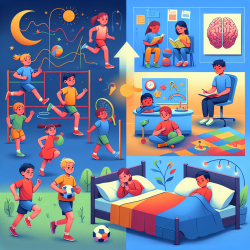Introduction
In the realm of child development, the interplay between physical activity (PA), sedentary behavior (SB), and sleep—collectively referred to as 24-hour movement behaviors—has garnered significant attention. A recent study titled The prospective associations of 24-hour movement behaviors and domain-specific activities with executive function and academic achievement among school-aged children in Singapore sheds light on how these behaviors impact children's cognitive and academic outcomes.
Key Findings
The study, conducted on school-aged children in Singapore, utilized accelerometers to measure 24-hour movement behaviors and assessed executive function and academic achievement through standardized tests. The results revealed nuanced associations between different types of physical activities, sedentary behaviors, and sleep with cognitive and academic outcomes.
Practical Implications for Practitioners
For practitioners working with children, these findings offer valuable insights that can be translated into actionable strategies to enhance cognitive and academic performance. Here are some key takeaways:
1. Promote Organized Physical Activities
- Finding: Participation in organized physical activities or sports was consistently associated with higher executive function and academic achievement.
- Action: Encourage children to participate in structured sports or physical activities. Schools and parents should facilitate access to such programs, emphasizing their cognitive benefits.
2. Encourage Outdoor Active Play
- Finding: Higher levels of outdoor active play were favorably associated with both executive function and academic achievement.
- Action: Advocate for more outdoor playtime. Activities in natural environments can enhance attention, memory, and problem-solving skills, contributing to better cognitive development.
3. Limit Screen Time
- Finding: Higher screen viewing time, particularly television, was negatively associated with academic achievement.
- Action: Implement guidelines to limit screen time. Encourage alternative activities such as reading, which was positively associated with both executive function and academic achievement.
4. Ensure Adequate Sleep
- Finding: Reallocating time from moderate-to-vigorous physical activity (MVPA) to sleep was associated with higher academic achievement.
- Action: Prioritize sleep hygiene and ensure children get sufficient sleep. Educate parents about the importance of sleep for cognitive and academic performance.
Encouraging Further Research
While this study provides significant insights, it also underscores the need for further research. The complex relationships between different domains of physical activity, sedentary behavior, and sleep with cognitive outcomes warrant more detailed investigations. Practitioners are encouraged to stay abreast of emerging research and integrate evidence-based practices into their interventions.
Conclusion
The study highlights the multifaceted nature of movement behaviors and their impact on children's cognitive and academic outcomes. By promoting organized physical activities, encouraging outdoor play, limiting screen time, and ensuring adequate sleep, practitioners can help optimize children's development. For a deeper understanding of the research, please refer to the original paper: The prospective associations of 24-hour movement behaviors and domain-specific activities with executive function and academic achievement among school-aged children in Singapore.










